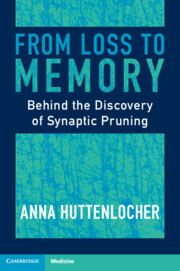Book contents
- From Loss to Memory
- From Loss to Memory
- Copyright page
- Dedication
- Contents
- Preface
- Acknowledgments
- 1 Counting Synapses
- 2 Discovering Synaptic Pruning
- 3 Else, Peter’s Mother
- 4 Richard, Peter’s Father, and Peter’s Uncle Fritz
- 5 Greiz: Kriegskinder (Children of War)
- 6 In Braubach, after the War
- 7 Arrival in America
- 8 Harvard Medical School
- 9 Understanding Sleep and Consciousness: Research at the National Institutes of Health
- 10 Entering the Cognitive Revolution: Neuroscience and Cognitive Psychology
- 11 Physician First, Scientist Second?
- 12 Comparative Brain Regions and Synapse Formation
- 13 Stimulating Progress on Developmental Brain Disorders
- 14 Neurodevelopmental Disorders and Schizophrenia: A Role for Synaptic Pruning?
- 15 Early Childhood Education
- 16 Peter and Janellen’s Collaboration
- 17 Microglial Cells and the Mechanisms of Synaptic Pruning
- 18 Looking Forward: Being a Physician and a Scientist
- 19 Parkinson’s Disease and Berlin
- 20 Auf Deutsch: Back to German
- 21 Memories and Reflections at the End: A Return Trip to Greiz
- Glossary
- Index
- References
11 - Physician First, Scientist Second?
Published online by Cambridge University Press: 10 October 2023
- From Loss to Memory
- From Loss to Memory
- Copyright page
- Dedication
- Contents
- Preface
- Acknowledgments
- 1 Counting Synapses
- 2 Discovering Synaptic Pruning
- 3 Else, Peter’s Mother
- 4 Richard, Peter’s Father, and Peter’s Uncle Fritz
- 5 Greiz: Kriegskinder (Children of War)
- 6 In Braubach, after the War
- 7 Arrival in America
- 8 Harvard Medical School
- 9 Understanding Sleep and Consciousness: Research at the National Institutes of Health
- 10 Entering the Cognitive Revolution: Neuroscience and Cognitive Psychology
- 11 Physician First, Scientist Second?
- 12 Comparative Brain Regions and Synapse Formation
- 13 Stimulating Progress on Developmental Brain Disorders
- 14 Neurodevelopmental Disorders and Schizophrenia: A Role for Synaptic Pruning?
- 15 Early Childhood Education
- 16 Peter and Janellen’s Collaboration
- 17 Microglial Cells and the Mechanisms of Synaptic Pruning
- 18 Looking Forward: Being a Physician and a Scientist
- 19 Parkinson’s Disease and Berlin
- 20 Auf Deutsch: Back to German
- 21 Memories and Reflections at the End: A Return Trip to Greiz
- Glossary
- Index
- References
Summary
Peter arrived as a new assistant professor of pediatric neurology at Yale University in 1966. This was in the midst of the Reye’s syndrome peak of the late 1960s. Reye’s syndrome is a life-threatening pediatric disease characterized by progressive brain and liver damage in children, often after a viral illness. It became a rare condition after epidemiological studies suggested a link between aspirin use in children and the onset of Reye’s syndrome after a viral illness. The reduced rates of Reye’s syndrome are largely attributable to public health messaging to limit aspirin use in children, but until that change, it often fell to pediatric neurologists to keep Reye’s syndrome patients alive.
- Type
- Chapter
- Information
- From Loss to MemoryBehind the Discovery of Synaptic Pruning, pp. 69 - 76Publisher: Cambridge University PressPrint publication year: 2023



